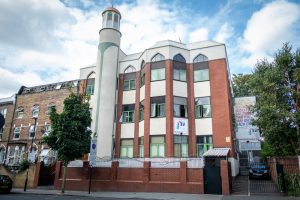With mosques closed, prayers are moving online and video conferencing apps will be used for iftar parties at sunset.

Finsbury Park mosque, north London. Islamic centres across the country have suspended activities during lockdown.
At Finsbury Park mosque in north London – once a byword for extremism, now a model of tolerance and community outreach – the first night of Ramadan heralds a month of communal praying, eating and charity work. About 2,000 people attend prayers each day. Volunteers cram into its kitchen to prepare iftar, the meal that breaks the Ramadan fast at sunset, for 300 people each night.
Not this year. “We will miss all that,” said Mohammed Kozbar, the mosque’s general secretary. The building’s gates are locked, with only security guards patrolling its prayer halls and community spaces. “I visited last week. It was heartbreaking to see it empty and silent,” said Kozbar.
The world’s 1.8bn Muslims are facing the most important period of the Islamic year, the holy month of Ramadan, which starts this week, under lockdown because of the global coronavirus pandemic.
Mosques in most countries are shut and gatherings forbidden. The holy sites of Mecca and Medina in Saudi Arabia are under curfew. The al-Aqsa mosque and Dome of the Rock in Jerusalem’s Old City are closed and prayers suspended.
In the UK, the Muslim Council of Britain (MCB) called for the suspension of all congregational activities at mosques and Islamic centres on 16 March, a week before the government announced all places of worship must close under the lockdown order.
On Friday, the Mosques and Imams National Advisory Board said Islamic buildings would remain closed during Ramadan until the lockdown is lifted. “It would be deemed extremely irresponsible to congregate for night prayers or hold religious gatherings during this Ramadan in any mosque or houses with people who are not members of the immediate household,” said Qari Asim, a Leeds imam and chair of the board.
“During the epidemic, the desire to perform prayers with a congregation in a mosque comes second to saving lives.”
For Muslims, to be unable to take part in congregational prayers and break the fast with family and friends during Ramadan was “emotionally challenging, frustrating and culturally alien”, he added.
Shelina Janmohamed, the author of Generation M: Young Muslims Changing the World and vice-president of Islamic marketing at Ogilvy Consulting, said: “This is going to be the most unusual Ramadan of my lifetime and I think in the living memory of Muslims across the UK.”
The Islamic holy month was “a time of togetherness and spiritual congregation. Those are the two anchors [of Ramadan], and built into that is a nostalgia around traditions and rituals. Even those who might not normally classify themselves as observant Muslims feel drawn to Ramadan because those feelings of togetherness and community are built into us from childhood.”
Like other faiths, Muslims are using technology to meet the challenges of lockdown. Ramadan prayers and the nightly recitation of the Qur’an will move online, and fundraising for charities will also be digital. Platforms such as Zoom are expected to host iftar parties.
Guidance is being drawn up by Islamic scholars on exemptions from fasting for people who are vulnerable to coronavirus. Muslims working long shifts in essential services will “need to be pragmatic in their approach” to fasting, said Harun Khan, secretary general of the MCB.
“This Ramadan will be at a slower pace. It will give us more time for reflection and the opportunity to be closer to God,” he said. Instead of visiting different mosques every day, Khan will be spending Ramadan at home with his immediate family.
According to Asim: “There is likely to be a tiny group of zealous people who may try to organise iftar events or congregational night prayers in their homes. My message to them is that selfishness has no place with God.”
He also warned that extreme rightwing groups were “trying to use the pandemic to create division” and were scapegoating Muslims for the spread of the virus.
At Finsbury Park mosque, there are plans to distribute iftar meals to people in need or alone who would normally come in person. “People who volunteer with us every Ramadan are calling to say, ‘Please, how can we help?’,” said Kozbar.
The mosque will be streaming lectures and prayers, offering online counselling and organising members to take food to staff at nearby hospitals. “This lockdown is something new for us, like everyone else. It’s a very difficult time, but we want to do our bit.”
Source: The Guardian
 Arabic
Arabic English
English Spanish
Spanish Russian
Russian Romanian
Romanian Hindi
Hindi Tagalog
Tagalog Bengali
Bengali Sinhalese
Sinhalese Nepali
Nepali

